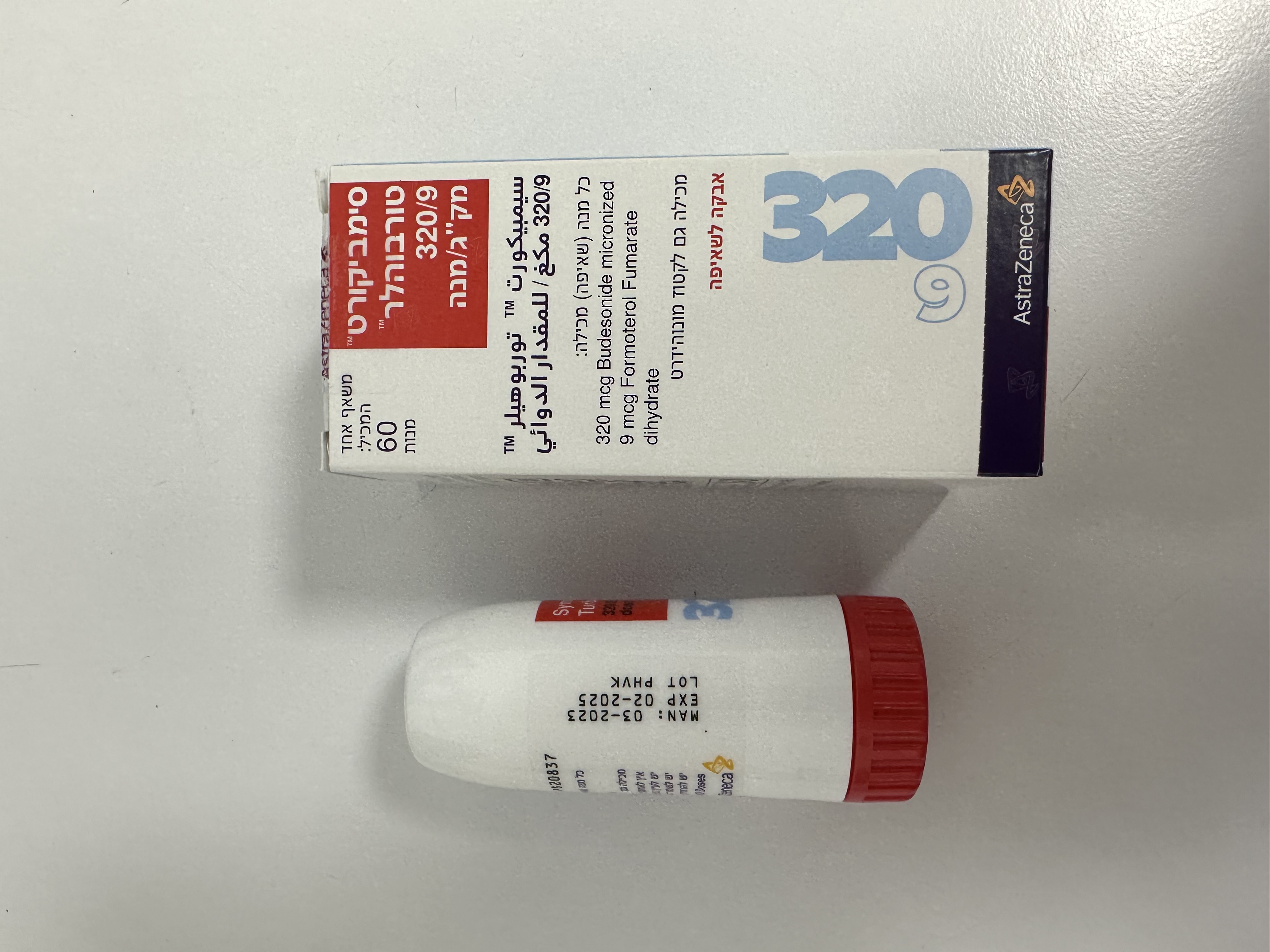Quest for the right Drug

סימביקורט טורבוהלר 320/9 מק"ג/מנה SYMBICORT TURBUHALER 320/9 MCG/DOSE (BUDESONIDE MICRONIZED, FORMOTEROL FUMARATE)
תרופה במרשם
תרופה בסל
נרקוטיקה
ציטוטוקסיקה
צורת מתן:
שאיפה : INHALATION
צורת מינון:
אבקה לשאיפה : POWDER FOR INHALATION
עלון לרופא
מינוניםPosology התוויות
Indications תופעות לוואי
Adverse reactions התוויות נגד
Contraindications אינטראקציות
Interactions מינון יתר
Overdose הריון/הנקה
Pregnancy & Lactation אוכלוסיות מיוחדות
Special populations תכונות פרמקולוגיות
Pharmacological properties מידע רוקחי
Pharmaceutical particulars אזהרת שימוש
Special Warning עלון לרופא
Physicians Leaflet
Adverse reactions : תופעות לוואי
4.8 Undesirable effects Since Symbicort Turbuhaler 320/9 mcg/dose contains both budesonide and formoterol, the same pattern of undesirable effects as reported for these substances may occur. No increased incidence of adverse reactions has been seen following concurrent administration of the two compounds. The most common drug related adverse reactions are pharmacologically predictable side-effects of β2 adrenoceptor-agonist therapy, such as tremor and palpitations. These tend to be mild and usually disappear within a few days of treatment. Adverse reactions, which have been associated with budesonide or formoterol, are given below, listed by system organ class and frequency. Frequency are defined as: very common (1/10), common (1/100 and <1/10), uncommon (1/1000 to <1/100), rare (1/10 000 to <1/1000) and very rare (<1/10 000). Table 1 SOC Frequency Adverse Drug Reaction Infections and infestations Common Candida infections in the oropharynx Pneumonia (in COPD patients) Immune system disorders Rare Immediate and delayed hypersensitivity reactions, e.g. exanthema, urticaria, pruritus, dermatitis, angioedema and anaphylactic reaction Endocrine disorders Very rare Cushing's syndrome, adrenal suppression, growth retardation, decrease in bone mineral density Metabolism and nutrition Rare Hypokalaemia disorders Very rare Hyperglycaemia Psychiatric disorders Uncommon Aggression, psychomotor hyperactivity, anxiety, sleep disorders Very rare Depression, behavioural changes (predominantly in children) Nervous system disorders Common Headache, tremor Uncommon Dizziness Very rare Taste disturbances Eye disorders Uncommon Vision blurred (see also section 4.4) Very rare Cataract and glaucoma Cardiac disorders Common Palpitations Uncommon Tachycardia Rare Cardiac arrhythmias, e.g. atrial fibrillation, supraventricular tachycardia, extrasystoles Very rare Angina pectoris, prolongation of QTc-interval Vascular disorders Very rare Variations in blood pressure Respiratory, thoracic and Common Mild irritation in the throat, coughing, mediastinal disorders dysphonia including hoarseness Rare Bronchospasm Gastrointestinal disorders Uncommon Nausea Skin and subcutaneous Uncommon Bruises tissue disorders Musculoskeletal and Uncommon Muscle cramps connective tissue disorders Candida infection in the oropharynx is due to drug deposition. Advising the patient to rinse the mouth out with water after each maintenance dose will minimise the risk. Oropharyngeal Candida infection usually responds to topical anti-fungal treatment without the need to discontinue the inhaled corticosteroid. If oropharyngeal thrush occurs, patients should also rinse their mouth with water after the as-needed inhalations. As with other inhalation therapy, paradoxical bronchospasm may occur in very rarely, affecting less than 1 in 10,000 people, with an immediate increase in wheezing and shortness of breath after dosing. Paradoxical bronchospasm responds to a rapid-acting inhaled bronchodilator and should be treated straightaway. Symbicort should be discontinued immediately, the patient should be assessed and an alternative therapy instituted if necessary (see section 4.4). Systemic effects of inhaled corticosteroids may occur particularly at high doses prescribed for prolonged periods. These effects are much less likely to occur than with oral corticosteroids. Possible systemic effects include Cushing's Syndrome, Cushingoid features, adrenal suppression, growth retardation in children and adolescents, decrease in bone mineral density, cataract and glaucoma. Increased susceptibility to infections and impairment of the ability to adapt to stress may also occur. Effects are probably dependent on dose, exposure time, concomitant and previous steroid exposure and individual sensitivity. Treatment with β2 agonists may result in an increase in blood levels of insulin, free fatty acids, glycerol and ketone bodies. Paediatric population It is recommended that the height of children receiving prolonged treatment with inhaled corticosteroids is regularly monitored (see section 4.4). Reporting of suspected adverse reactions Reporting suspected adverse reactions after authorisation of the medicinal product is important. It allows continued monitoring of the benefit/risk balance of the medicinal product. Any suspected adverse events should be reported to the Ministry of Health according to the National Regulation by using an online form: https://sideeffects.health.gov.il/

מסגרת הכללה בסל
התוויות הכלולות במסגרת הסל
| התוויה | תאריך הכללה | תחום קליני | Class Effect | מצב מחלה |
|---|---|---|---|---|
| COPD | ||||
| אסטמה |
שימוש לפי פנקס קופ''ח כללית 1994
לא צוין
תאריך הכללה מקורי בסל
01/01/2009
הגבלות
תרופה מוגבלת לרישום ע'י רופא מומחה או הגבלה אחרת
מידע נוסף
